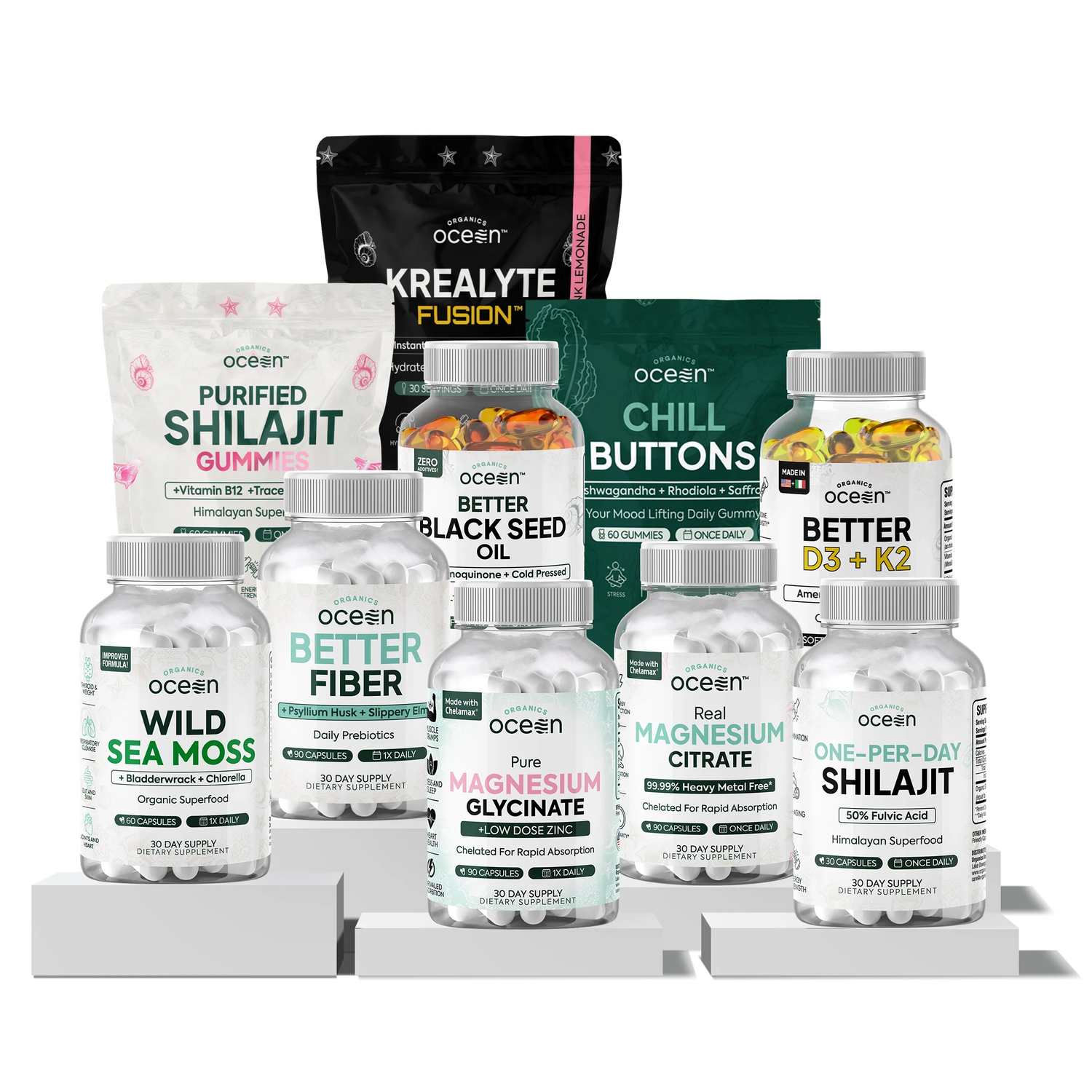
Magnesium Glycinate and Anxiety: Exploring its Calming Effects and Benefits
Share
Magnesium glycinate is a form of magnesium that's combined with the amino acid glycine. This particular type of magnesium is known for its potential benefits on mental health, specifically its ability to alleviate anxiety. Anxiety is a condition that involves feelings of intense fear, unease, or nervousness, and can impact many aspects of a person's life.
Incorporating magnesium glycinate into your routine may help reduce anxiety symptoms due to its calming and stress-reducing effects. Glycine, naturally found in protein-rich foods like fish, dairy, and meat, has been shown to improve sleep, reduce inflammation, and help manage metabolic disorders such as diabetes. Cleveland Clinic highlights that these qualities make magnesium glycinate an ideal supplement for those looking to improve their mental well-being.
While there's still more research needed to fully understand the relationship between magnesium glycinate and anxiety, it's important to consider if this supplement may be beneficial for you. Discuss your options with a healthcare professional to ensure you're making the best decision for your individual needs.
Understanding Magnesium Glycinate
Chemical Composition
Magnesium glycinate is a combination of the essential mineral magnesium and the amino acid glycine. The compound is formed when magnesium ions bind to glycine molecules. This chelated form of magnesium improves its absorption and bioavailability, making it a popular choice for supplementation. Here's an overview of magnesium glycinate's chemical composition:
- Mineral: Magnesium
- Amino Acid: Glycine
- Type: Chelated Magnesium
Bioavailability
When it comes to magnesium supplements, their effectiveness is largely determined by how well the body can absorb and utilize the mineral. Magnesium glycinate is known for its high bioavailability and easy absorption by your body. This is mainly due to its chelated form and the presence of glycine, which enhances magnesium's solubility and absorption rate.
Comparison With Other Magnesium Supplements
There are various types of magnesium supplements available, each with different absorption rates and benefits. Here's a brief comparison of magnesium glycinate with other popular forms:
-
Magnesium citrate: This is a common form of magnesium supplement that combines magnesium with citric acid. Its bioavailability is higher than magnesium oxide, but lower than magnesium glycinate.
-
Magnesium oxide: A less expensive option, magnesium oxide has a lower bioavailability and is less easily absorbed by the body. It is often used as an antacid or laxative.
-
Magnesium chloride: Found in some topical applications and salt forms, magnesium chloride is more bioavailable than magnesium oxide but has a lower magnesium content per weight compared to other forms.
-
Magnesium lactate: A more easily absorbed form of magnesium due to its water solubility, magnesium lactate is often used to treat digestive issues.
-
Magnesium taurate: Combining magnesium with the amino acid taurine, this supplement is often used to support cardiovascular health.
-
Magnesium sulfate: Commonly known as Epsom salt, magnesium sulfate is often used topically in baths or foot soaks for muscle relaxation.
In summary, magnesium glycinate stands out among other forms of magnesium supplements due to its high bioavailability, which makes it a preferred choice for those looking to support their overall health, reduce anxiety, and improve sleep.
The Role of Magnesium in Mental Health
Magnesium and the Brain
Magnesium plays a crucial role in your neurological health, as it influences several functions within the central nervous system, such as transmission and intracellular signal transduction. It also helps regulate neurotransmitters, which are responsible for sending messages throughout your brain and nervous system.
In particular, magnesium helps maintain the balance between excitatory and inhibitory neurotransmitters. Some of the key neurotransmitters it affects are:
- Glutamate: An excitatory neurotransmitter
- GABA (Gamma-aminobutyric acid): An inhibitory neurotransmitter
- Serotonin: A neurotransmitter that contributes to feelings of well-being and happiness
Having balanced neurotransmitter activity is vital for healthy brain function and mood regulation.
Anxiety and Stress-Related Disorders
When your magnesium levels are low, it can lead to an imbalance in neurotransmitter activity, which may contribute to heightened levels of anxiety and stress. Magnesium has been found to have an indirect effect on the stress response system, primarily through its influence on cortisol levels, a hormone responsible for regulating stress.
Taking magnesium could help your body cope better with generalized anxiety, mild anxiety, and other stress-related disorders by:
- Promoting relaxation by increasing GABA, an inhibitory neurotransmitter that quiets the nervous system.
- Regulating cortisol levels, which helps your body respond appropriately to stress.
Magnesium's Impact on Depression and Mood
Supplementing with magnesium has also been associated with improvements in depression symptoms and overall mood. Low magnesium levels can cause an imbalance in the mentioned neurotransmitters, ultimately contributing to mental health issues like depression.
Magnesium can have a positive impact on your mood by:
- Aiding serotonin production, which regulates mood and improves feelings of well-being.
- Enhancing the function of other crucial neurotransmitters involved in mood regulation.
If you're concerned about your magnesium intake and its impact on anxiety, depression, or mental health in general, it’s important to consult with a healthcare professional. They can help guide you to make the necessary dietary adjustments or recommend appropriate supplements to support your individual needs.
Potential Side Effects and Interactions

Common Adverse Effects
Magnesium glycinate is generally well-tolerated, but like any supplement, it can have side effects. Some common adverse effects include nausea, diarrhea, and vomiting. These side effects are more likely to occur if you take excessive amounts beyond the recommended dietary allowance (RDA). To minimize the risk of side effects, start with a low dose and gradually increase it as needed. If you experience persistent side effects, consult your healthcare professional.
Interactions With Medications and Nutrients
Magnesium glycinate can interact with certain medications:
- Antibiotics: High doses of magnesium can interfere with the absorption of some antibiotics, making them less effective. Space your magnesium intake and antibiotic dose by at least 2 hours.
- Bisphosphonates: Magnesium may reduce the absorption of bisphosphonates used to treat osteoporosis. To avoid this interaction, separate magnesium and bisphosphonate doses by at least 2 hours.
Additionally, magnesium supplementation may affect the absorption of other nutrients, like calcium and zinc. Monitoring your intake and discussing it with a healthcare professional can help ensure you maintain a proper balance of nutrients.
Recognizing Magnesium Toxicity
Though rare, magnesium toxicity can occur if you take an excessive amount of magnesium glycinate. Symptoms of toxicity include:
- Muscle weakness
- Difficulty breathing
- Irregular heartbeat
In cases of severe overdose, coma or death can occur. If you suspect magnesium toxicity, seek immediate medical attention.
To avoid toxicity, adhere to the recommended dietary allowance for magnesium and consult with a healthcare professional before beginning supplementation. It is essential to monitor your intake and be aware of the potential side effects and interactions with other medications and nutrients.
Supplementing with Magnesium Glycinate
Guidelines for Supplementation
Magnesium glycinate is a form of magnesium supplement that is bound to the amino acid glycine, which can be found naturally in protein-rich foods like fish, dairy, and meat. This bioavailable form of magnesium is well-tolerated and less likely to cause gastrointestinal side effects, making it a popular choice for people looking to improve their magnesium levels and potentially alleviate anxiety symptoms 1.
To ensure you're consuming adequate magnesium in your diet, consider incorporating magnesium-rich foods such as nuts, spinach, fruits, seeds, bananas, avocados, and milk. However, if you're unable to meet the National Institutes of Health's Recommended Daily Allowance (RDA) for magnesium through your dietary intake alone, magnesium glycinate supplements can be a useful addition to your routine 2. The general guideline for adults is about 275 mg of magnesium per day. It's crucial to follow the dosing instructions provided by the manufacturer, as excessive magnesium supplementation can lead to negative side effects like diarrhea and abdominal cramping.
Sourcing and Quality Considerations
When selecting a magnesium glycinate supplement, pay attention to the quality and sourcing of the product. Look for reputable brands that follow Good Manufacturing Practices (GMP) standards and have undergone third-party testing to ensure the purity and potency of their supplements 3.
In summary, incorporating magnesium-rich foods into your diet and considering magnesium glycinate supplementation can contribute to maintaining healthy magnesium levels. Always consult with your healthcare professional before starting any new supplement regimen and follow dosing guidelines to ensure safe and effective use.
Footnotes
Frequently Asked Questions

What are the proven benefits of magnesium glycinate for anxiety relief?
Magnesium glycinate is a highly bioavailable form of magnesium that has been linked to anxiety relief. Its calming effect is due to its ability to limit the release of the stress hormone cortisol, preventing much of it from reaching your brain. This can help reduce feelings of anxiety and promote relaxation.
How much magnesium glycinate is recommended daily for managing anxiety symptoms?
The recommended dosage of magnesium varies depending on factors such as age, sex, and overall health. It's best to consult your healthcare provider for personalized advice on the right dosage for you. They will consider the severity of your anxiety symptoms and any potential interactions with other medications or supplements you are taking.
Can magnesium glycinate improve sleep quality for individuals with anxiety?
Yes, magnesium glycinate can improve sleep quality for individuals with anxiety. It helps to promote relaxation and calm the nervous system, which can lead to a better night's sleep. In addition, magnesium is known to be involved in the regulation of sleep cycles, making it an essential nutrient for optimal sleep and overall well-being.
Are there any side effects associated with using magnesium glycinate for anxiety?
Some side effects you might experience when taking magnesium glycinate for anxiety include digestive issues like diarrhea, upset stomach, or nausea. However, these side effects are generally mild and tend to subside as your body adjusts to the supplement. As always, consult your healthcare provider if you are concerned about side effects or have any questions about the use of magnesium glycinate for anxiety.
How does magnesium glycinate compare to other forms of magnesium in treating anxiety?
Magnesium glycinate is considered superior to other forms of magnesium due to its high bioavailability and minimal side effects. Other forms of magnesium may not be as easily absorbed by your body, leading to reduced effectiveness or increased gastrointestinal side effects. Therefore, magnesium glycinate is often recommended for anxiety relief over other forms of magnesium.
What do user reviews typically highlight about the effectiveness of magnesium glycinate for anxiety?
User reviews for magnesium glycinate often highlight its effectiveness in helping to reduce anxiety symptoms, improve sleep quality, and provide an overall sense of calm without causing major side effects. However, it's essential to remember that individual experiences can vary, and you should consult your healthcare provider before starting any new supplement regimen for anxiety relief.
